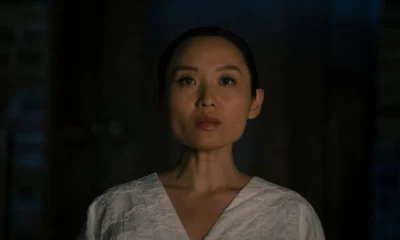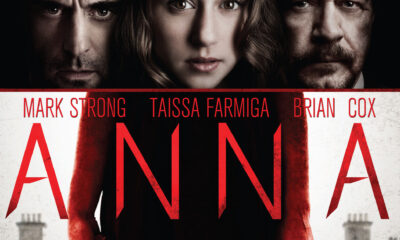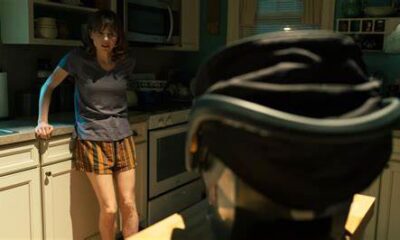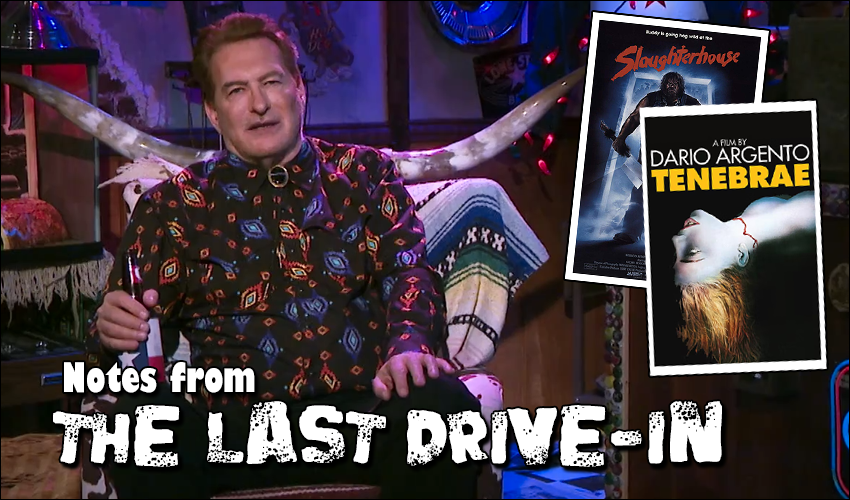
Notes from the Last Drive-In: S4E5 – ‘Slaughterhouse’ and ‘Tenebrae’
Haunted MTL’s Notes from the Last Drive-In continues this week with S4E5, featuring Slaughterhouse (1987) and Tenebrae (1982). Does the show maintain the moment from last week’s brilliant Nosferatu double feature, a series highlight, or do we see another crack in the foundations this season?
How well does Shudder‘s premiere movie hosting program do this week, and does the “junk food” night theme work, or is the loose stitching of films that best not be paired? Let’s find out together, shall we?
Slaughterhouse (1987)
Rich Roessler’s 1987 film Slaughterhouse is considered a slasher comedy. The movie follows an old man named Lester Bacon (Don Barrett) and his son Buddy Bacon (Joe B. Barton), who go on a killing spree when their dilapidated hog farm is being foreclosed upon in the interest of a more modern facility. Soon, community members, such as a group of local teens like Liz Borden (Sherry Leigh), meet gruesome fates as the local sheriff Fred Borden (Willliam Houke) investigates the deaths.
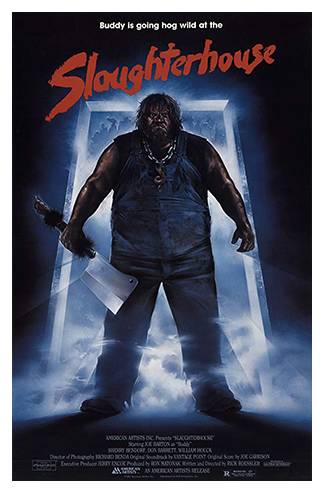
Rick Roessler wrote and produced the film with cinematography by Richard Benda and edited by Sergio Uribe, made for a budget of $110,000. The film has achieved a puzzling cult following, mainly on the back of actor Joe B. Barton, who proved to be the most exciting thing associated with the film.
This is a rough one. We’ve not been to such terrible movie depths since back during the infamous double feature of Sledgehammer and Things. Slaughterhouse, in many ways, can be seen as the poster child of the downfall of slashers, coming well after the genre had more or less declined in 1984.
The film is nonsensical; most of the kills are one-note, and the only character who amounts to much grunts like a pig for the movie’s duration. The film offers no shock, no sense of dread, and every beat is predictable. This is honestly one of the most paint-by-numbers slasher films I’ve seen. It doesn’t even have a solid musical identity, nor any real impressive shots. Even the kills feel lacking to a great degree.
There are a few gems in the pile of pig droppings, though. A loony sequence of the snorting killer joy-riding in the police cruiser is pretty fun, and a couple of the kills are worth adding to a reel, involving a grinder and another with a powerful blow to the abdomen. Beyond that, though, there isn’t much to love about it. Most of the charisma comes from actor Joe B. Barton as Buddy, and all he does is wield an improbably-large looking cleaver, grunt like a pig, and kill a few folks.
The film doesn’t even use the slaughterhouse setting and humans as meat substitutes to its advantage. So much of the movie creates motivation for the killers tied to the slaughterhouse industry, and it doesn’t add much to the proceedings. I think a more insane director with supreme bad taste could have done a hell of a lot more with this one. There is a decent slasher buried deep in this one, but the director must trim the fat.
Joe-Bobservations on Slaughterhouse
The highlight of the evening was a toss-up between Joe Bob’s torturing of resident vegan Darcy the Mail Girl with meat factoids or Joe Bob’s tepid praise over the film. There was a lot of hot dog history with some digressions into the nature of the hog slaughter process, which worked to give Joe Bob and Darcy some fun little argumentative bits. Darcy does have a point that the filming of the slaughter of the pigs (even if people ate them) seemed unnecessary. After all, critics could say the same thing about Cannibal Holocaust.
More subtle were some of the dunks Joe Bob had over the quality of the film. The film wasn’t great, and it was apparent to our host, but he delivered the relevant factoids we Mutants crave. The stories surrounding actor Joe B. Barton doing press tours as Buddy Bacon were hilarious, including an apparent meeting with President Ronald Reagan. How the hell?
The first half of the night closed out with Darcy in protest, dressed as a pig and singing the praises of the animals, as they are pretty adorable. She also presented Joe Bob with a package from Buddy himself with props from the movie, which was pretty sweet.
Final Thoughts on Slaughterhouse
I could not get into this one. It wasn’t a film that was so unpleasant that it put me off, but instead, I felt little to engage with during the run time. Virtually no characters worth caring about with some predictable kills and overly set-up plot result in perhaps one of the worst films shown in The Last Drive-In. Occasionally we need these movies, though, and there is some stuff worth celebrating within it, but as a whole, this probably would have made for a film better paired with something like The Texas Chainsaw Massacre 2. It would have helped the movie go down better, especially given the evening’s follow-up, Tenebrae.
Joe Bob Briggs gave the film 2 1/2 out of 4 stars. I feel like he was maybe overly generous here. I would give Slaughterhouse 1 1/2 out of 5 Cthulhus. It could have been meatier.
 (1.5 / 5)
(1.5 / 5)
Best Line: “Buddy’s a good boy, but he has what you might call basic hygiene problems.” – Lester Bacon
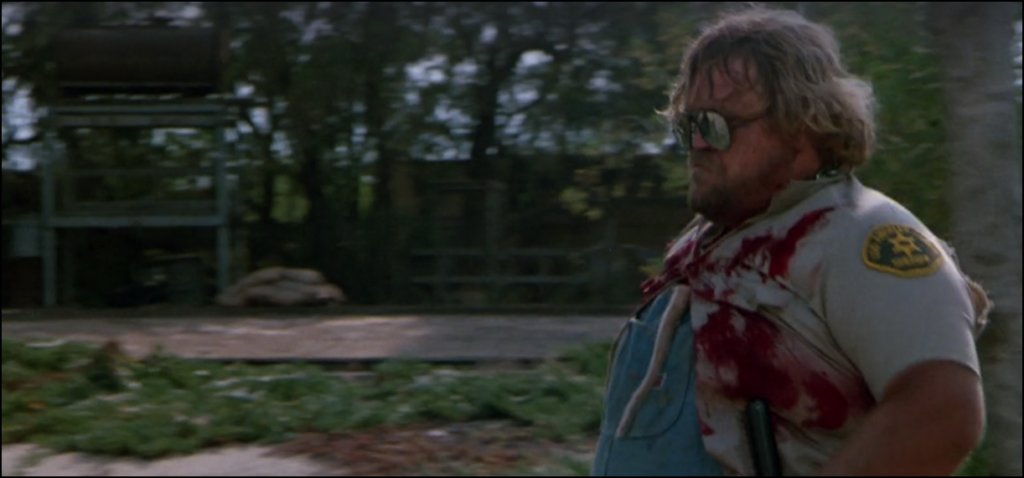
Tenebrae (1982)
How do you follow up on one of the most generic slasher films ever made? With one of the most Giallo and the Gialli in Dario Argento’s Tenebrae (1982). The film, written and directed by Dario Argento, features editor Franco Fraticelli and cinematographer Lucian Tovoli, frequent collaborators with Dario Argento. The film also features a soundtrack with three of the members of Goblin, Claudio Simonetti, Fabio Pignatelli, and Massimo Morante.
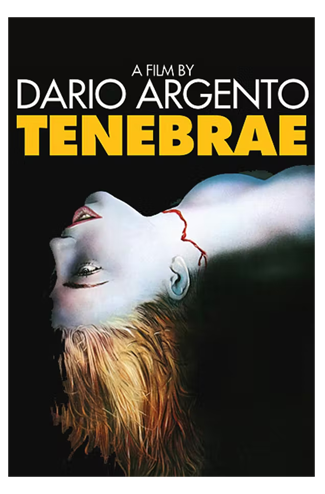
The film follows an author, Peter Neal (Anthony Franciosa), who goes to Rome to promote his latest novel with his literary agent Bullmer (John Saxon), and assistant Anne (Daria Ncolodi). He is also followed by an ex-lover, Jane (Veronica Lario). Upon his arrival, a woman is murdered, and soon bodies pile up, all seemingly reflecting the author’s work. Who is the killer, and what is their connection to Neal?
While not the best of Argento’s output, it’s a quality film. It returns to a more classical form of the Giallo for Argento after the supernatural diversions of Suspiria (1977) and Inferno (1980). The film is also quite bitter in many ways, seemingly reacting to Argento’s feelings about critics toward his work and comments about women’s treatment in his movies. Of course, he would be cagey regarding these ideas in typical Argento fashion over the years. As with most of his work, the film operates heavily on dream logic and strange thematic elements that at times seem purposeful and at other times thrown in.
The story itself is fine, though the revelation and fake out feel arbitrary because the film needed some extra twist with the reasoning being fast and loose to wring out a little more mystery. The core idea of an author trying to figure out murders based on his writing is novel enough, at least for the time, but has been done more compellingly elsewhere.
The characters are primarily broad caricatures with strange Argento flourishes except for one or two. Anthony Franciosa is fantastic and makes the film work as well as it does, lending this Italian feature a little credibility. John Saxon is John Saxon, which is entirely appropriate. Saxon plays one or two types of characters – smarmy jerk and stern father – but plays them very well. He fills the smarmy jerk role here, but his presence is always welcome. Giuliano Gemma as Detective Giermani is good, but he’s a distant third in presence behind Franciosa and Saxon.
However, the women do not get as much to sink their teeth into here. Daria Nicolodi is a fine actress but primarily relegated to the role of assistant and hysterical screamer with little agency. Then again, Dario Argento’s treatment of Nicolodi is not surprising. Veronica Lario looks pretty and dies well. Eva Robin’s (her chosen name), the transgender actress who plays the girl on the beach in an erotically charged scene, is a refreshingly modern casting choice, looking just suitable for the role of the sexual beach siren who humiliates an essential character in their youth.
The aesthetics of the film are notable. Where Argento’s films may falter in writing, plot, and characterization as a whole (there are exceptions), his depiction of mood, his inventive framing, and his close relationship with the best Italian prog-rockers of the 1970s, Goblin, means you’re going to have a good time no matter how indecipherable his movies can get. The film has some beautiful shots and staging. One scene depicting an amputation splatters a stark white environment with arcs and slashes of bright red blood, an early kinetic and gorgeous moment. One scene in public space among the fascistic brutalist architecture of Mussolini’s Rome evokes Alfred Hitchcock with tight alternating edits and dramatic angles, bringing tension to crowded daylight.
Of course, the theme tune is among the best of the Argento and Goblin collaborations.
While the film falls apart structurally and logically, it is never dull and presents genuine moments of shock and surprise. It hits all the crucial hallmarks of Giallo and can be wildly inventive, sometimes to its detriment. A two-and-a-half-minute tracking shot up, over, and down the side of a house to the film’s theme song is one of the more puzzling examples of excess.
Joe-Bobservations on Tenebrae
Dario Argento is always a bit of a weird one when it comes to The Last Drive-In. The director is undoubtedly one of the most influential directors of horror in Italy and the genre worldwide, but his works tend to be hit or miss for our host. There was some of that ambivalence on display during the episode as, again, we are presented with stunning moments, but the film itself was rather loosely strung together.
However, what is always refreshing is when the ball is in Darcy’s court, and her knowledge of Italian horror is always welcome, especially when Joe Bob appears bewildered by it all.
As for insights into the film, I feel my favorites were the background of Anthony Franciosa, the lead, who was compelling and problematic. I also appreciate the reveal that John Saxon has no memory of making this film. Of course, the revelation of transgender actress Eva Robin’s and the nature of the sexy beach scene was also quite fun.
Perhaps the best moments of the show are when Joe Bob’s frustrations come to the surface and, as a result of this, his sheer annoyance with the tracking shot was quite hilarious.
Final Thoughts on Tenebrae
While Tenebrae is undoubtedly not the highlight of Dario Argento’s career, the film is one of the purest expressions of his aesthetics and logic. The structure may be a bit flimsy, but my god, does it look good. Tenebrae is an impressive house of cards, supported by a base of three or four strong performers, great music, cinematography, and some Italian Giallo weirdness.
Joe Bob gave the film 4 out of 4 stars. I think that is to be expected; as much as he grouses about some of Dario Argento’s impulses, Joe Bob has a level of respect for the guy, and the films are generally quite excellent. While Tenebrae is quite remarkable, I also do not feel it is worth a perfect score on my scale. I have some issues with it, but I’ll still watch the hell out of it. I’d give Tenebrae 4 out of 5 Cthulhus.
 (4 / 5)
(4 / 5)
Best Line: “I’ve been charged, I’ve tried building a plot the same way you have. I’ve tried to figure it out; but, I just have this hunch that something is missing, a tiny piece of the jigsaw. Somebody who should be dead is alive, or somebody who should be alive is already dead.” – Peter Neal
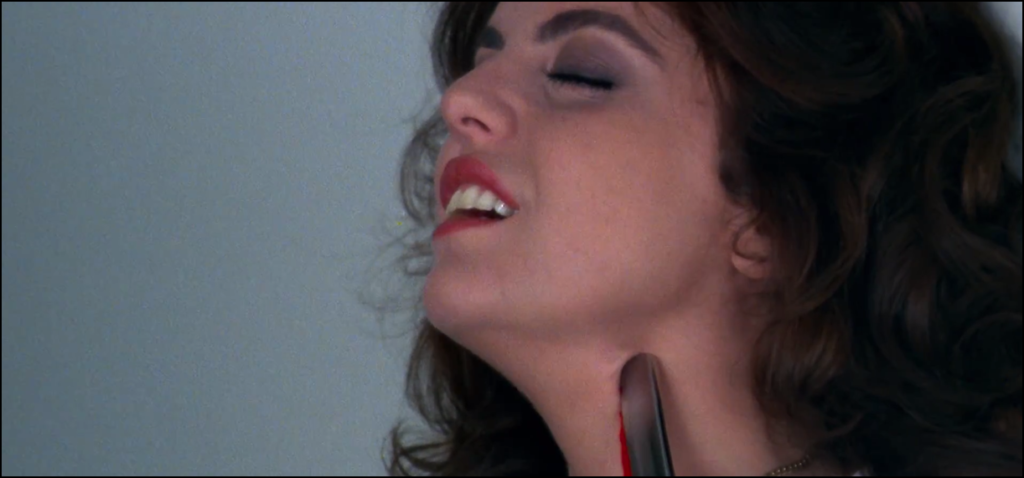
Haunted MTL Drive-In Totals
As always, we have the official drive-in totals from the groovy ghoulies over at Shudder.
And we have our totals for the evening.
- 62 vertical miles of elevated horror
- 76 hot dogs
- 5 German Hot Dog Fathers
- 350 Pounds
- 6 Dumb Teens
- Hot Dog Map Fu
- Celebrity Chef Name Drop Fu
- Pig Boy Joy Ride Fu
- Pork Pun Fu
- Letter Opening Fu
- Pig Disco Dancing
- Tiajuana Sluicing
- Thigh Stabbing
- Tower Tumbling
- Dissociating
- Gratuitous Airport
- Gratuitous Dancing
- Gratuitous Latin
- Beach Gangbang
- Surprise Lumberto Bava
- Street Trash Defense Force
- Darcy Cosplay (Pig and Jane)
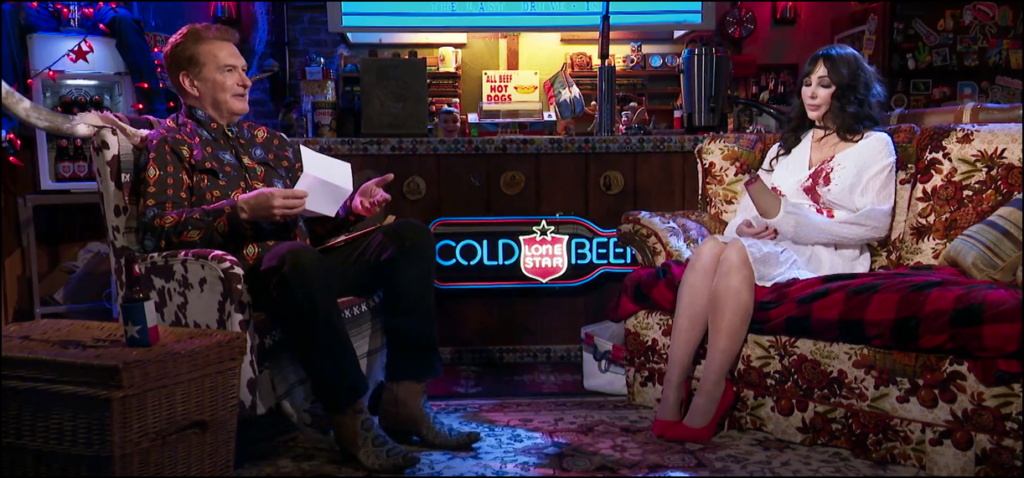
Episode Score for the Last Drive-In: S4E5 – Slaughterhouse and Tenebrae
I was pleased with how well last week went regarding the night’s theme. It certainly helped that both films were excellent, but the night felt far more cohesive overall than this season. The pairing made a lot more sense, and the movies worked together for something more significant. It was Nosferatu (1922) and the 1979 remake, but it worked.
Unfortunately, we are taking a step back this week. The stated theme was a junk food night, but unlike a hot dog, the connective tissue was absent between the films. I suppose the idea is that Giallo might be like the 1970s and 1980s junk food of Italian cinema, but it felt like a stretch, especially given how good Tenebrae is compared to Slaughterhouse.
I have been dinging the show pretty hard this season for what I feel is a mismatch in the juxtaposition of the films. That hasn’t been an issue before because it was expected, and the show hadn’t quite stated so explicitly what they were going for in episodes during previous seasons. It was more fun to interpret. Now that the show says, “this is [insert night here],” the pairing seems looser and less exciting.
Hell, The Cannibal Man (1972), one of the films shown in the mid-evening trailers, would have been a better pairing with Slaughterhouse. What’s going on?
Slaughterhouse was mainly terrible but could have been salvaged had it not been paired with a film that completely obliterated its quality. The evening’s theme completely fell flat as well. I feel like I can only give this episode of The Last Drive-In 3 1/2 out of 5 Cthulhus.
 (3.5 / 5)
(3.5 / 5)
With that, we are done until next time. Please join us again next week for another review and recap. What did you think, though? Why not share your thoughts in the comments about the show and the two films shown. Did you have a favorite?
Please join us on Twitter next Friday as we live-tweet with the rest of the Mutant Fam during The Last Drive-In with Joe Bob Briggs.
Want more meaty fun? (Sponsored link)
Instead of watching Slaughterhouse paired with Tenebrae, consider pairing it with The Cannibal Man. Our sponsored link to Amazon can help you snag a blu-ray copy, and you’ll be helping out the site.
Movies n TV
Wheel of Time A Question of Crimson Is a Political Espionage Delight
Episode two of Wheel of Time felt like the beginning of a long journey. Stories are unfolding, lives are changing, and blood is spilling.
Let’s discuss.
The story
We begin this episode in the past with Elayne’s mother, Queen Morgase. It turns out her rise to the throne was a bit, shall we say, cutthroat. So when she shows up at the White Tower, Siuan is concerned.
She might have reason to be, too.
Meanwhile, Rand, Egwene, Moiraine, Lan and Aviendha are in the Spine of The World. As they travel through some of the most breathtaking lands I have ever seen on a TV show, Egwene is plagued with nightmares. We think at first that’s just her trauma working itself through her system. But we soon find out that it might not be that straightforward.
Finally, Perrin returns home to heal after his hand is almost cut in half. But when he gets there he finds the town has been infested by Children of The Light. And they’re looking for him.
What worked
There was something heartwarming in this episode about political espionage and choking religious persecution. And that is Elayne’s relationship with her family.
I have consumed a lot of fantasy content with royal families. And I have never once heard a princess call her mother ‘Mum’. I’ve never seen royal siblings get along. And I have sure as hell never seen a princess have a good relationship with her step-parent.
This was refreshing. Even though Queen Morgase is kind of a horrible person she seems like a good mother. And that’s an unexpected delight.

Of course, this is just one storyline among many. And while this can sometimes be overwhelming, in this case it wasn’t.
I’ll be honest, some of these storylines are going to drag for me. I know this because I’ve read some of the Wheel of Time books and I have an idea that not all the characters exactly pique my interest.
No one likes all the characters. No one likes all the storylines. While I am here for the political espionage between Queen Morgase and Siuan, not everyone likes it. While others might be fascinated with Selene trying to win Rand back, I couldn’t care less.
Having multiple storylines keeps everyone’s attention better. So long as things don’t get out of hand. Things can easily get out of hand. But this seems to be managed well.
So far.
What didn’t work
As I mentioned above, I’m not thrilled with Rand’s story at this point. And while it’s fine to not like a storyline when there are this many to choose from, it’s not fantastic that the one I like the least is the one involving our two main characters. And anytime we were with the team at the Spine of The World, the only thing that brought me joy was Moirain’s hat. It reminded me of Stockard Channing’s hat in Practical Magic.
The problem is that Rand is Charlie Brown with controversial magical powers. He is boring, serious, and pessimistic.
And yes, I understand that he has a heavy emotional burden and he’s the Dragon Reborn and that’s quite taxing and all. But let’s be fair, there isn’t a single person in this show that doesn’t have a heavy burden. And most of them manage to be fun occasionally.

All that being said, this episode of Wheel of Time did exactly what it needed to do. It set up conflicts at each of the three locations. It established emotional ties between the characters and the events. And it established goals for everyone.
This was, in short, a solid episode. Not groundbreaking, not mind-blowing or life changing. It was simply good. It was entertaining and moved the plot forward.
Well done.
 (3.5 / 5)
(3.5 / 5)
Movies n TV
Wheel of Time Returns With A Bang
Wheel of Time is back for season three. There are mixed feelings regarding this. Last season, there were some serious pacing issues. And some serious sticking to the book’s storyline issues. But we’re two seasons in, and we don’t give up so easily. So let’s dive into episode one, To Race the Shadow.
By the way, I highly recommend watching this episode with the subtitles on. You’ll see why.
The story
We begin this episode with Liandrin facing a trial of sorts for her rampant betrayal. She does her best to gaslight her Aes Sedai sisters into thinking that Siuan Sanche is the real traitor.

When that doesn’t work, she reveals how many Black Aes Sedai have actually infiltrated the tower.
Spoiler, it’s a lot.
In the aftermath, our whole team gathers to drink and enjoy one night of relaxation before they head out to the Tear to form an army for Rand. All is going well until they’re attacked by myriad creatures and a sentient axe.
What worked
This episode was long. It had a run time of an hour and eleven minutes. And a lot of that run time was spent in heavy dialog scenes.
Fortunately, these were well-done scenes.
If you’re going to have a lot of talking scenes, there are good ways and bad ways to do it. Last season, we saw lots of examples of the bad way to do it. But this episode did it well. For one thing, other things were going on while conversations were taking place. The characters are drinking, playing games, walking through an interesting city. And the scenes themselves didn’t stretch out. They weren’t repetitive. We heard what the character had to say, then we moved on.
It was also nice that the point of these scenes wasn’t just info dumps. We had character development. We had romantic interactions. We had plot development and foreshadowing.
Overall, this episode felt like what it was. A moment of calm before a storm.
Taking a step back, I’d be remiss if I didn’t address the fight scene at the start of the episode. Because it was epic.
The magic looked amazing. The martial arts that went along with it looked fantastic. The costumes were beautiful. It was just incredibly fun to watch.
More than that, it was emotional. We lost some characters in that fight that were important. And it was clearly emotionally shattering for many of our characters, who found themselves betrayed by people they trusted.
So many of them.
It was a great way to open the season.
What didn’t work
Despite that, this episode wasn’t without its flaws.
First off, there were a lot of dialog scenes. And they were good scenes, as I’ve already discussed. But it was one after another after another. And when your episode is, again, an hour and eleven minutes, it’s maybe a little much to have so much chit-chat. Couldn’t some of these conversations, important as they were, have been moved to maybe another episode?
Finally, I want to talk about Egwene’s travel through the arches.

I feel like maybe there were some deleted scenes here. Because there must have been more to that visit than what we saw, right?
We could have seen Egwene battle Rand. That would have been badass and emotionally devastating. We could have seen her with a quiet life with Rand back home at the Two Rivers. We could have seen anything except for the quick clip of Rand in a bloody river, followed by Egwene being shoved back out in a bloody shift.
No products found.
Bad job. But at least it wasn’t an extended scene of Moiraine collecting bathwater, and then taking a bath while looking sad. If we’d started this season with another scene like that, it might have broken my brain.
Amazon dropped the first three episodes at once. So we’ll be back soon to talk about episode two. See you then.
 (4 / 5)
(4 / 5)
Movies n TV
Entertaining as hell: Eight Legged Freaks (2002) Review
Early 2000s is a special era for the industry. It accepts the cheesiness and corniness of movie making, in turn producing some gems in their own right. Eight Legged Freaks starring David Arquette and young Scarlet Johanson is a horror comedy about giant spiders who overtake a small town. As crazy as that premise sounds, the movie surprisingly has a ton of heart and is super entertaining. Let’s review, shall we?
Plot
We start Eight Legged Freaks with a shot of toxic waste spilling into the water supply of Joshua, a spider farm owner. He is friends with Mike, one of our protagonists, who is a science geek and a spider enthusiast. Mike notices something quite right upon visiting Joshua, but no one takes him seriously. We are then introduced to the rest of the crew. Mike’s mother Samantha, the town sheriff, is too busy chasing Ashley, his sister, who is dating the town mayor’s son Bret (something Samantha does not approve of). We also have Chris, who returns to the town to save his father’s legacy in the town mines. He has opposition from Wade, Bret’s father, who wants to use the mines for his business ventures. Lots of drama going on that will only get juicier once the spiders get loose.
The creepy crawlies quickly dispose of Joshua and make their grand appearance after Ashley rejects Bret’s advances, abandoning him in the middle of a desert. A glorious chase sequence ensues as the spiders make their way towards the town, wreaking havoc on its residents. In a true horror fashion (which the movie acknowledges), it takes some convincing from Mike and then from Samantha for the town to take the threat seriously. The tongue-in-cheek style of narrative adds the comedy aspect to a movie that would otherwise burn out fairly quickly.
The remaining characters hide out in a shopping mall as it’s the only somewhat sturdy building in the area. This doesn’t last long as the spiders break in, forcing them to run through the mines. Their resources to fight the creepy crawlies off are limited as the methane gas doesn’t allow them to use firearms. Such conditions require resourceful thinking from Chris, who uses perfume to fend off the leader of the spider group and save himself during the climax of the movie.
Character dynamics are not forgotten once the action kicks in. We have Chris confessing his long-term feelings for Samantha which she knew all along, which provided some comedic relief. Bret also reunites with Ashley and apologises for being an asshole. Mike finally gets the appreciation he deserves as his knowledge saves the townsfolk more than once during the whole ordeal.
We end the movie with the town’s radio show person telling the story as an urban legend during his segment. This brings it into question – how much of it happened the way he said it did? We can only guess…
Overall thoughts
Eight Legged Freaks is a fun creature feature with some self-aware commentary on genre tropes that doesn’t take itself too seriously. The acting is good, the pacing fitting and the characters are likeable enough for you to want them to make it through. Definitely a must watch, if you don’t suffer from arachnophobia, that is.
 (5 / 5)
(5 / 5)
- What do you get when you cross toxic waste with a bunch of exotic spiders? Eaten! The townies of Prosperity, Arizona will all become a screaming smorgasbord if mutated arachnids as big as SUVs have their way in this comedy/horror crowd pleaser whose creators include the producers of Independence Day and Godzilla
- Spiders that leap like gazelles, web-spitting spiders, spiders that suck your insides out as if through a straw—they’re all among the behemoths conjured up by an inventive effects team
- David Arquette (Scream) leads the two-legged stars, mobilizing the citizenry in a last-ditch fight to survive
Last update on 2025-03-10 / Affiliate links / Images from Amazon Product Advertising API








